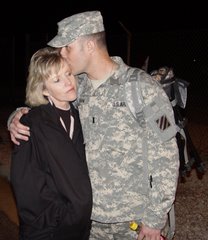Serious success in Iraq is not being recognised as it should be
(The Times)
Is no news good news or bad news? In Iraq, it seems good news is deemed no news. There has been striking success in the past few months in the attempt to improve security, defeat al-Qaeda sympathisers and create the political conditions in which a settlement between the Shia and the Sunni communities can be reached. This has not been an accident but the consequence of a strategy overseen by General David Petraeus in the past several months. While summarised by the single word “surge” his efforts have not just been about putting more troops on the ground but also employing them in a more sophisticated manner. This drive has effectively broken whatever alliances might have been struck in the past by terrorist factions and aggrieved Sunnis. Cities such as Fallujah, once notorious centres of slaughter, have been transformed in a remarkable time.
Indeed, on every relevant measure, the shape of the Petraeus curve is profoundly encouraging. It is not only the number of coalition deaths and injuries that has fallen sharply (October was the best month for 18 months and the second-best in almost four years), but the number of fatalities among Iraqi civilians has also tumbled similarly. This process started outside Baghdad but now even the capital itself has a sense of being much less violent and more viable. As we report today, something akin to a normal nightlife is beginning to re-emerge in the city. As the pace of reconstruction quickens, the prospects for economic recovery will be enhanced yet further. With oil at record high prices, Iraq should be an extremely prosperous nation and in a position to start planning for its future with confidence.
None of this means that all the past difficulties have become history. A weakened al-Qaeda will be tempted to attempt more spectacular attacks to inflict substantial loss of life in an effort to prove that it remains in business. Although the tally of car bombings and improvised explosive devices has fallen back sharply, it would only take one blast directed at an especially large crowd or a holy site of unusual reverence for the headlines about impending civil war to be allowed another outing. The Government headed by Prime Minister Nouri al-Maliki has become more proactive since the summer, but must immediately take advantage of these favourable conditions. The supposed representatives of the Iraqi people in Baghdad need to show both responsibility and creativity if the country's potential is to be realised.
The current achievements, and they are achievements, are being treated as almost an embarrassment in certain quarters. The entire context of the contest for the Democratic nomination for president has been based on the conclusion that Iraq is an absolute disaster and the first task of the next president is to extricate the United States at maximum speed. Democrats who voted for the war have either repudiated their past support completely (John Edwards) or engaged in a convoluted partial retraction (Hillary Clinton). Congressional Democrats have spent most of this year trying (and failing) to impose a timetable for an outright exit. In Britain, in a somewhat more subtle fashion admittedly, Gordon Brown assumed on becoming the Prime Minister that he should send signals to the voters that Iraq had been “Blair's War”, not one to which he or Britain were totally committed.
Saturday, November 3, 2007
Subscribe to:
Post Comments (Atom)





No comments:
Post a Comment